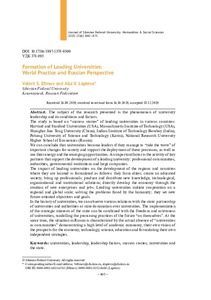Formation of Leading Universities: World Practice and Russian Perspective
Скачать файл:
URI (для ссылок/цитирований):
https://elib.sfu-kras.ru/handle/2311/131305Автор:
Efimov, Valerii S.
Laptevа, Alla V.
Ефимов, В.C.
Лаптева, А.В.
Дата:
2020Журнал:
Журнал Сибирского федерального университета. Гуманитарные науки. Journal of Siberian Federal University. Humanities & Social Sciences; 2020 13 (6)Аннотация:
The subject of the research presented is the phenomenon of university leadership and its conditions and factors. The study is based on “success stories” of leading universities in various countries: Harvard and Stanford Universities (USA), Massachusetts Institute of Technology (USA), Shanghai Jiao Tong University (China), Indian Institute of Technology Bombay (India), Pohang University of Science and Technology (Korea), National Research University Higher School of Economics (Russia). We can conclude that universities become leaders if they manage to “ride the wave” of important changes for society and support the deployment of these processes, as well as use their energy and the emerging opportunities. An important factor is the activity of key partners that support the development of a leading university: professional communities, authorities, governmental institutions and large companies. The impact of leading universities on the development of the regions and countries where they are located is formulated as follows: they form elites; create an educated society, bring up professionals; produce and distribute new knowledge, technological, organizational and institutional solutions; directly develop the economy through the creation of new enterprises and jobs. Leading universities initiate cooperation on a regional and global scale; solving the problems faced by the humanity; they set new future-oriented objectives and goals. In the history of universities, we can observe various relations with the state: partnership of universities and authorities or state domination over universities. The implementation of the strategic interests of the state can be combined with the freedom and activeness of universities, modelling the promising practices of the future “on themselves”. At the same time, the situation in Russia is characterized by the actual absence of “universities as communities” demonstrating a high level of academic autonomy, their own vision of the prospects for the economy, technology, science, education and formulating their own independent strategies Предметом исследования является феномен лидерства университетов, условия и факторы, способствующие его достижению. В качестве материала использованы
«истории успеха» ведущих университетов различных стран: Гарвардского
и Стэнфордского университетов (США), Массачусетского технологического
института (США), Шанхайского университета Цзяо-Тун (Китай), Индийского института технологий Бомбея (Индия), Пхоханского университета науки и технологий
(Корея), Национального исследовательского университета «Высшая школа экономики» (Россия). Показано, что университеты становились лидерами, если им удавалось «поймать волну» важных для общества изменений и, с одной стороны, поддерживать развертывание этих процессов, с другой – использовать их энергетику
и возникающие возможности. Также можно выделить ключевых партнеров, которые поддерживали становление университета-лидера – профессиональные сообщества, государство и правительственные агентства, крупные компании. Обсуждается
воздействие ведущих университетов на развитие регионов и стран, к которым
они принадлежат: они формируют элиты; создают образованное общество, выращивают профессионалов; производят и распространяют новые знания, технологические,
организационные, институциональные решения; непосредственно развивают
экономику через создание новых предприятий и рабочих мест. Университеты-
лидеры инициируют сотрудничество в региональном и глобальном масштабе; решение стоящих перед человечеством проблем; задают новые смыслы и цели – энергетику движения в будущее. В истории университетов прослеживаются различные
варианты их взаимоотношений с государством: партнерство университетов и государственной власти либо доминирование государства над университетами. Возможно также сочетание реализации стратегических интересов государства с широкой свободой и высокой активностью университетов, моделирующих «на себе» перспективные практики будущего. Особенность ситуации России состоит в фактическом отсутствии «университетов-сообществ», обладающих высоким уровнем
академической автономии, имеющих собственное видение перспектив экономики,
технологий, науки, образования и формулирующих свои стратегии
Коллекции:
Метаданные:
Показать полную информациюСвязанные материалы
Показаны похожие ресурсы по названию, автору или тематике.
-
Developing Language Competency of University Teachers to Implement Content and Language Integrated Learning (CLIL) in a Regional University: Challenges and Prospects
Godzhaeva, Natalia S.; Logunov, Timur A.; Годжаева, Н.С.; Логунов, Т.А. (Сибирский федеральный университет. Siberian Federal University., 2015-11)A fundamental flaw in FL training is the fact that it is based either mostly on the principles of General Language, thus leaving graduates unprepared for their occupational-specific language needs, or predominantly ... -
New Generation of Universities. University 4.0
Laptevа, Alla V.; Efimov, Valerii S.; Лаптева, А.В.; Ефимов, В.С. (Сибирский федеральный университет. Siberian Federal University., 2016-11)The ongoing changes in universities are considered in the logic of change of socio-economic development phases – as an aspect of the post-industrial transition. The content of the society and university development phases ... -
Towards Constructing Identity of a National University: “Our Past” at the Websites of Russian Universities
Chernyavskaya, Valeria E.; Safronenkova, Elena L.; Чернявская, В. Е.; Сафроненкова, Е. Л. (Сибирский федеральный университет. Siberian Federal University, 2019-10)This study explores the question how the concept of university identity may be suited to address the relationship between present and past. As two central notions social identity and reputation are discussed. We presume ... -
Mentoring as a form of assistance to a transport university student in the "University-Enterprise" networking cooperation
Осипова, С. И.; Кузьмина, Н. А.; Гафурова, Н. В.; Осипов, В. В. (2019-02)The paper deals with mentor's role and the requirements for improving the practical and professional skills of a transport university graduate. Effectiveness was estimated by increasing the formation level of their ... -
Municipal Methodical Service as a Subject of the University Threefold Network
Belova, Elena N.; Bondareva, Olesya S.; Белова, Е.Н.; Бондарева, О.С. (Сибирский федеральный университет. Siberian Federal University., 2015-08)The article discusses the possibilities of a municipal methodical service as a subject of a threefold network of self-training organization of additional professional education of a university in order to develop ...

